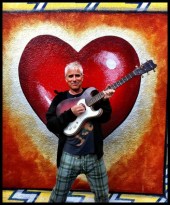Love can take many forms—the physical, the emotional, the spiritual among them. Each can stand alone in a beautiful way, but when the myriad types of love entwine, truly revelatory things can occur—as they do throughout Thunder Love, the long-awaited new album by world music voyager Jai Uttal.
“I feel like this album is about opening up to love—finally,” he says. “That involved letting go of a huge part of me that said ‘I don’t deserve love,’ or on really bad days, ‘love doesn’t exist.’ For me, it’s taken big catharses to change those deep internal patterns. I’ve immersed myself in a great number of spiritual practices, but truly embracing human life…that’s what brought me through the times of terrible darkness and addiction.”
Thunder Love is, in many ways, a sonic approximation of darkness giving way to dawn. But in its depiction of the first rays of a new rising sun, there’s an acknowledgment of the shadows that came before, shadows that Uttal addresses with bold directness on songs like “Bolo Ram (Let the Spirits Sing),” a multi-layered, densely-percussive piece that ranks with his most personal outpourings.
That song finds Uttal “looking…for some evidence that there’s still a reason to be alive,” proof that’s ultimately revealed in the most positive way. A similar dichotomy works its way through “Hanuman’s Heart,” a bracing electric blues cleaved by Jai’s piercing electric guitar. On both songs—as well as several of the disc’s other offerings—he dovetails smoothly from narrative to chant, from English to Sanskrit, making for a fascinating sonic and emotive blend.
“The songs tend to have verses that describe the human condition and Sanskrit mantras as choruses. These prayers are so entwined with my inner condition, my daily life, that they have to go together with the English lyrics,” he explains. “The mantras are not necessarily representative of linear thoughts, but they connect us to a greater thought—at times, I’ve felt they were the only thing keeping me alive.”
Those ancient Sanskrit words have unmistakable power, but Uttal’s own lyrics are every bit as striking. He hadn’t worked extensively in English-language lyrics since the Grammy-nominated 2002 album Mondo Rama—which, in many ways, was his darkest effort—but on Thunder Love, the words flow vibrantly, from the poignantly picturesque imagery of “Down on My Knees” to the straightforward bliss of the epic “Never Felt This Love.”
“I felt a subconscious need to pull back and not be as emotionally expansive,” he says of his more recent forays into meditative territory, a space he explored with wondrous results on Kirtan!, a double-disc collection of traditional sacred chant. “The process was more internal, more introspective, because I was rediscovering myself, reassessing my life.”
That reassessment was sped along by his marriage to Brazilian-born Nubia Teixeira and the subsequent birth of son Ezra Gopal, Jai’s first child—events that pulled him from what he refers to as “the most troubled time in my life.” He credits his spouse not only with fostering an emotional renaissance, but a musical one as well, thanks to her impelling him further into the gentle rhythms of her homeland.
“I’m constantly moved by the (Brazilian) culture,” Jai says. “I fell in love with the sounds many years ago, but it wasn’t until I met Nubia that I really became immersed in it. It’s a huge country with so much regional diversity that you’re always discovering something new.”
Uttal has cut a serpentine swath through the musical world over the course of a recording career that’s spanned more than two decades, with treks into multi-cultural world music, avant-garde jazz, electronic rock and traditional Indian kirtan—or sacred chants—that have become staples in the yoga-practicing community.
While he began his journey as a child, studying classical piano, Jai’s first love was the traditional music of Appalachia—a sound that’s found its way into his recordings on a regular basis ever since. His exploratory nature soon took him even further afield, resulting in a move to California, where he immersed himself in studies with the legendary Ali Akbar Khan (Ravi Shankar)—with whom he maintains a musical connection to the present day.
Jai then began regular pilgrimages to India, living among the Bauls, the wandering street musicians of Bengal, and singing with the kirtan wallahs in the temples of his guru, the highly revered saint, Neem Karoli Baba. Upon returning to the states, he began weaving those variegated threads together in earnest, earning widespread critical acclaim with the first recording issued under his own name—1991’s Footprints, on which he teamed with jazz icon Don Cherry.
Soon thereafter, Uttal formed the Pagan Love Orchestra, a loosely-knit aggregation that recorded several acclaimed albums, notably Shiva Station, on which he worked closely with producer Bill Laswell—a contributor on Thunder Love as well. With those musicians—many of whom, like keyboardist Peter Apfelbaum, remain in his camp—he’s created a sonic landscape that’s constantly shifting, but eminently relatable at every turn.
“Music has always been the way for me to feel whole and to feel free,” he explains. “On another level, it’s been the way for me to feel pain and channel it. When I am doing music, it’s as if all my insides are calling out. People have said they find great joy in what comes forth when that happens, and if that’s the case, I feel I’ve done what I am here to do.”
For more information, please contact:
Asha Goodman or Carla Sacks at Sacks & Co., 212.741.1000,
asha.goodman@sacksco.com or carla@sacksco.com.
